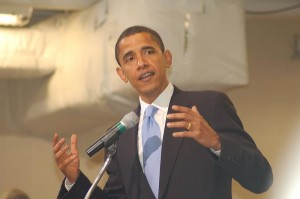 It’s tempting to wonder how candidate Barack Obama would have performed in 2008 if he had campaigned on President Barack Obama’s agenda in the first seven months of 2012. Imagine if the Illinois Senator had gone on record favoring a rewrite of federal regulations to mandate Catholic institutions to cover contraceptives in their insurance plans; if he had endorsed same-sex marriage; if he had pledged to dismantle the work requirement at the centerpiece of welfare reform; and if he claimed the executive authority to alter federal immigration laws on his own without waiting for congressional approval.
It’s tempting to wonder how candidate Barack Obama would have performed in 2008 if he had campaigned on President Barack Obama’s agenda in the first seven months of 2012. Imagine if the Illinois Senator had gone on record favoring a rewrite of federal regulations to mandate Catholic institutions to cover contraceptives in their insurance plans; if he had endorsed same-sex marriage; if he had pledged to dismantle the work requirement at the centerpiece of welfare reform; and if he claimed the executive authority to alter federal immigration laws on his own without waiting for congressional approval.
The likely result is that the base of his party would have been thrilled at such a thoroughgoing progressive vision, but that Obama would have hardened his image as a Kerry/Dukakis like cultural liberal with a tin ear for Middle America. The McCain campaign certainly would have had ammunition fresher than the obscure William Ayers to cast Obama as an ideological risk and, perhaps, a path to divert conservative independents and blue collar Hillary Clinton voters from the crevasses in the economy.
 In the real universe, and not this parallel one of progressive fantasies, Obama campaigned as someone quite different from the liberal warrior Republicans would have relished running against. To the extent Obama ventured into cultural politics at all, it was with the measured nuance of a Clintonian moderate: tolerant of civil unions, but opposed to gay marriage on religious grounds; respectful of the public divide on reproductive rights, and virtual silence on an immigration proposal that had dominated congressional debate just two summers earlier. Obama even described the welfare reform that he had opposed as a rookie legislator as an unmitigated success and its work requirement as a “centerpiece of any social policy.”
In the real universe, and not this parallel one of progressive fantasies, Obama campaigned as someone quite different from the liberal warrior Republicans would have relished running against. To the extent Obama ventured into cultural politics at all, it was with the measured nuance of a Clintonian moderate: tolerant of civil unions, but opposed to gay marriage on religious grounds; respectful of the public divide on reproductive rights, and virtual silence on an immigration proposal that had dominated congressional debate just two summers earlier. Obama even described the welfare reform that he had opposed as a rookie legislator as an unmitigated success and its work requirement as a “centerpiece of any social policy.”
One possibility is, of course, that the ideologically unbound Obama of this calendar year is the genuine article and that 2008 was a carefully cultivated pose. Another is that Obama is less the closet leftist, more the artful dodger who lifts up or discards hot-button issues based solely on how they affect the electoral calculus.
But even taking Obama’s moves charitably, as “evolution” or a response to changed circumstances, two variables are impossible to ignore. Even Obama’s defenders would be hard-pressed to deny that at least his latest flip-flop on welfare and the abrupt lurch to unilateral action on immigration are outright concessions to failure: in the welfare context, an acknowledgment that the labor market, especially for minorities, may be abysmal enough to justify abandoning a bipartisan consensus on whether welfare is an earned benefit or an entitlement; in the case of immigration, an admission that even a Democratic Congress couldn’t produce a solution.
The second irresistible conclusion is that Democrats have reverted to a strategic approach in which maintaining a foot in the cultural center of American politics is not much of a Democratic priority. An administration that is in court tangling with faith-based institutions over the tenets of their doctrine, and that has explicitly declared those same tenets as a wedge in a “war on women”, and a president who equates resistance to same sex marriage with Jim Crow and pre-civil rights era bigotry has staked out very different, more deliberately polarizing ground than either candidate Obama or the last Democratic president.
Whether the Romney campaign can make a meaningful case about Obama’s sharp break from the political center on social issues remains undetermined. To date, the Romney camp has steered clear of picking fights that are “off message” from its relentless focus on jobs and spending. And as maddening as it is to conservatives that the mainstream media brandish Romney’s shifts of position as a character flaw while ignoring Obama’s, the flip-flop allegation is always more damaging for a still vaguely defined challenger like Romney, much less so for a fully defined incumbent whose personal likability remains high.
But for both culturally conservative swing voters and moderate independents, Obama’s own policy choices and the directions he has been pushed into out of a position of political and economic weakness may make a more telling point: that one of the central promises of his original campaign, a kind of lofty, consensus minded renewal of national unity, is a thoroughly discarded possibility at this point. An Obama reelection means instead a resurgence of a Mondale-Dukakis-Kerry model that successful national Democrats tried hard to distance themselves from: interest group dominated, socially liberal, partisan to the core. Who knew that when Obama pledged to turn the page he meant backward, to the section the losers ran on?
(Cross-posted, with permission of the author, from OfficialArurDavis.com)









Leave a Reply